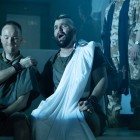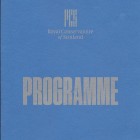Rape of Lucretia 2020Royal Conservatoire of Scotland
Read more about the opera Rape of Lucretia
Britten's early tragedy on a chamber scale has now found a secure place in the repertoire of several of our music colleges, and it has proved to be an excellent vehicle for students. In the last decades of the 20th century it was staged by what was then the RSAMD in Glasgow with some success. The Conservatoire last did it in 2012, so it was time for another go.
Lionel Friend got to know the opera from the inside working with ENO several decades ago. When their excellent staging was filmed for TV and issued on DVD in 1987, he was the highly successful conductor. Through his career he has worked in many important houses, including on the music staff at Bayreuth, and has also made a point of frequent collaboration with students. On this opening night he led the musicians in a quite superb account of the score. There are only thirteen players - quintets of wind and strings, plus percussion, harp and piano. Admittedly several of the players double, to produce a greater range of colours, so we also heard wonderfully atmospheric contributions from alto flute and piccolo, cor anglais, bass clarinet and timpani.
Jack Furness, a young and highly promising director, usually takes an intelligent line with his stage concept. This work does present certain awkward challenges, with Roman scenes several centuries BC framed by two chorus figures applying a more recent, if not contemporary, Christian gloss. On this occasion, the audience was met by a simple modern set, a hospital ward with several beds to the left and the ward office, a smaller space, on the right. As the music starts the ward is curtained off, we hear gunfire and soldiers run past at the back. In flashes of light we see a medic unsuccessfully trying to revive a casualty. As the action quietens, this clearly emotional medic, female, rushes to the office to clean up at the sink. She is joined by a man, also in military dress, but with clerical add-ons. As the padre he comforts her then begins his narration. These are the two Chorus figures.
The ward is then occupied by the three Roman officers, in timeless military fatigues - not contemporary, but certainly not Roman, either. The lack of any kind of atmosphere in the designs here begins to cause a problem, as there is no indication of the oppressive heat other than the wonderful orchestral palette. Collatinus and Junius retire for the night, leaving Tarquin roused for his ride to Rome, including a wet swimming of the Tiber. The same ward set, now with a solitary bed. does for the space where Lucretia and her women are occupied at their spinning wheels and their folding of laundry, until they are interrupted by the arrival of Tarquinius.
As the first act ends the sequence of 'Goodnights' is wonderfully soothing until the prince, left alone, freshens up with a shower as the music turns more menacing. By the second act, with his reappearance heralded by the Chorus, he is fully dressed again, ready for a quick getaway. The Male Chorus, fully involved emotionally, slowly pushes the central partition leftwards, with Lucretia's bed chamber shrinking as the walls close in claustrophobically and Tarquinius makes his move. The final scenes are also well plotted dramatically. However Junius makes his important address arousing the populace to overthrow the monarchy from the now much larger office - perhaps this could have been more effectively projected.
The generally effective student cast involved last time moved on long ago. Indeed the Bianca from 2012 progressed to become Cardiff Singer of the World. Whether any of the current crop will manage to emulate Catriona Morison, or an earlier Lucretia, Karen Cargill, remains to be seen. Certainly there were occasions when they experienced some difficulty in projecting the libretto by Ronald Duncan, which is often awkward on first reading. The notorious 'oatmeal slippers of sleep' and similar lines can sound most peculiar. The main problems came in the reflective ensembles.
For the most part the singing was of a very high standard and the characters were well differentiated. Robin Horgan's voice now has substantial power at his command and he gave a dramatically committed interpretation. Whether such strong involvement by the two Chorus figures is entirely desirable is debatable, but he and Charlotte Richardson certainly did everything asked of them. Lauren Young and her two servants also interacted well, giving clear indications of a family, or more properly household unit. Jolyon Loy, a tall figure, dominated the stage whenever he was on it, and the other two generals also made effective contributions.
Performance Cast
- Male Chorus
- Female Chorus
-
Charlotte Richardson (Jan 18, 24)
Hasmik Harutyunyan (Jan 20, 25)
- Collatinus a Roman General
- Junius a Roman General
- Tarquinius a Prince, son of King Tarquinius Superbus
- Lucretia wife of Collatinus
- Bianca Lucretia's nurse
- Lucia Lucretia's maid
-
Sara Nealley (Jan 18, 24)
Karina Bailey (Jan 20, 25)
Production Cast
- Conductor
-
Lionel Friend (Jan 18, 20, 25)
Teresa Riveiro Böhm (Jan 24)
- Director
- Designer - Sets
- Designer - Costumes
- Lighting


